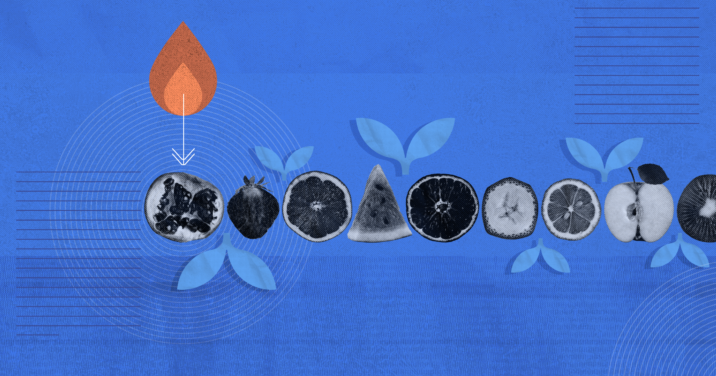Visit any church enough times and you’ll probably hear a sermon that spotlights Galatians 5:22–23—the “fruit of the Spirit” passage: “Love, joy, peace, patience, kindness … ” Sound familiar? It’s a perennial favorite of many preachers, as it dives into one of apostle Paul’s most upbeat (and quoted) verses in the New Testament.
But how do we know if we’re even producing the kind of fruit described by the apostle Paul? That’s the right question. Let’s take a quick look at the fruit metaphor, compare Paul’s list to real life, and consider the “why?” behind the words.
Why “fruit” of the Spirit?
Why did Paul use a word picture full of fruit, anyway? The short answer may be that agricultural references made a lot of sense to an agrarian society, the Bible’s original audience.
And the farm isn’t far from other portions of the Bible, either. Noah planted a vineyard (Gen 9:20). The book of Deuteronomy (22:9) specifies useful seed types. The book of Proverbs (20:4) talks about plowing. We could go on. Writers of both the Old and New testaments often defaulted to language and illustrations featuring farm produce like grapes, grain, orchards, and livestock.
So when Jesus told a story about a farmer who planted seed, or workers in a vineyard, or a fig tree needing fertilizer, his listeners got the message. They lived in that world. Why then wouldn’t the apostle Paul also use a fruit illustration when he wrote to the young church in Galatia? After all, fruit has been grown in the Turkish highlands for millennia (apricots, for example), and the Galatians there were well-acquainted with both vineyards and orchards, pruning and harvests. Paul’s use of good fruit to illustrate a healthy spiritual life would have resonated with them.
The harvest list
We know the Galatians understood fruit. Great. But the real challenge back then was, and is for us today: How do we apply this lesson to reality? What are the options? What actually happens, for instance, when new believers are “grafted” into God’s tree? Romans 11:17 uses that kind of agricultural language. And in Galatians 5, Paul writes about real-life changes that happen when we’re led by the Spirit—and he especially shines light on the contrast with our old lives.
Then follows the famous nine-point list, starting in verse 22. The fruit of the Spirit is:
- Love—an unselfish, self-sacrificing regard for the needs of others
- Joy—offering us the amazing byproduct of love, unhitched from daily circumstances
- Peace—not just the absence of conflict, but an active form of harmony that follows Spirit-filled believers like a shadow (see also Rom 8:6)
- Patience—because when we love someone, this quality is always put to the test (Guaranteed!)
- Kindness—when we imitate God’s attitude toward us as we graciously deal with others. Kindness often links to patience.
- Goodness—that flavors our thought life, through and through, as well as what we do. If we display this trait, what would others say about us?
- Faithfulness—which takes the long view, the year-to-year life marathon. And in the end, it wins.
- Gentleness—strength and self-control, a soft touch that imitates the way Jesus dealt with little children (and foolish disciples)
- Self-control—that keeps our worst desires in check. It affects everything, from what we eat to what we say to what we watch.
How many fruits of the Spirit: the big 9
Your Bible likely lists the nine qualities of a Spirit-filled life, just as we did here, possibly using a synonym or two along the way. “Longsuffering” instead of “patience” in the King James, for instance. Or “temperance” instead of “self-control.” Same thing.
Or is it 12?
But did someone mention a list of 12? Yes!
Many Catholics define the fruit of the Spirit with an expanded dozen attributes, not just nine. Why? Perhaps because the traditional Latin Vulgate version of the Bible mentions twelve, as did the Italian theologian Thomas Aquinas (1225–1274) in his famous Summa Theologica collection.1
Several catechisms follow suit. Here’s how the expanded verse reads (with a few words defined in brackets):
But the fruit of the spirit is charity, joy, peace, patience, benignity [kindness], goodness, longanimity [calm patience in the face of suffering], mildness, faith, modesty, continency [self restraint], chastity [purity]. Against such there is no law. (Gal 5:22–23, Latin Vulgate) 2
No matter which Bible version we use, the fruit of the Spirit is always correctly translated singular. So technically it’s “fruit of the Spirit,” not “fruits of the Spirit.” That may seem like a subtle detail, but it’s worth thinking about. It signals that the list—whether nine or twelve or any other number—should be taken as a group. This is where we wonder whether the fruit is a salad (taken one by one) or a smoothie (taken as a whole).
You decide. But here’s another way to look at it: According to St. Augustine, one of the leading thinkers of the early church, the number of attributes is not even the point.
Augustine opined in one of his Bible commentaries that Paul never cared about the number, but was only speaking in general terms, giving us a “for instance” list. Augustine pointed out that Paul didn’t say, “Against these things there is no law” (verse 23), but “against such things.” In other words, Paul was referring to those kinds of things—or things like them.3
How to develop the fruit of the Spirit
At this point the prospect of having fruit in our lives probably sounds very good. And naturally the question comes up: How then do I grow this fruit of the Spirit? According to the Bible, the starting point is a relationship with God through Christ. Building from there, the apostle Paul told his friends that,
… we have not ceased to pray for you, asking that you may be filled with the knowledge of his will in all spiritual wisdom and understanding, so as to walk in a manner worthy of the Lord, fully pleasing to him: bearing fruit in every good work and increasing in the knowledge of God; being strengthened with all power, according to his glorious might, for all endurance and patience with joy … (Col 1:9–11)
Does seeing fruit require endurance? Yes. And patience? Of course. After all, good fruit takes time to grow. But one thing is very sure: It’s all about God’s “glorious might,” not ours.
At no point can we rely on our own strength, or the entire transaction breaks down. So Paul told the Galatians to “walk by the Spirit, and you will not gratify the desires of the flesh” (Gal 5:16). And he assured the believers in Rome that “If you live according to the flesh you will die, but if by the Spirit you put to death the deeds of the body, you will live” (Rom 8:13).
It takes a willingness on our part to embrace the process, but the Spirit does the heavy lifting. As the Life Application Study Bible notes, we should “live each day controlled and guided by the Holy Spirit. Then the words of Christ will be in your mind, the love of Christ will be behind your actions, and the power of Christ will help you control your selfish desires.”4
With that same thought in mind, once more Paul urged the Romans to “Let us then with confidence draw near to the throne of grace, that we may receive mercy and find grace to help in time of need” (Heb 4:16).
So that’s a start: receiving mercy and finding grace. From the Spirit. Meanwhile, you’ll find more about the fruit of the Spirit in the free Logos Bible study app (desktop, web, or mobile), or even in a helpful group study.
Next steps
From his parish in Devon, England, Anglican priest Robert Hawker (1753–1827) once prayed that:
“All the pleasant and precious fruits of the Spirit are laid at the gates of worship and the word of your gospel. They come anew and in fresh supply from you, sweet and refreshing. By faith, and in your leading and strength, you enable me to bring them home, to live upon them, and feed upon them from day to day! You lay them up in my heart.”5
Well, that sounds like a pleasant prospect. And apparently the fruit of the Spirit helps our relationships, too. But then what? John Cassian (AD 360–435), an early church leader from the area of Europe that is now Romania and Bulgaria, wrote about the “fruit of the gospel,” and asked God in his prayer to “grant that this may become holy and saving food for all the people of your church, for people of all ages.”6
Although it may burst our bubble, Cassian was clearly saying that Galatians 5:22 fruit is not just for our own private consumption or enjoyment, but it’s intended to stir up everyone in the church. So let the work begin! As Danish reformer Hans Tausen (1494–1561) prayed,
“Give me your Holy Spirit to live in my heart, to guide and encourage me to live according to your holy word, that I would never despise or neglect to listen and learn. But lay it on my inner heart so that it may create good fruit in me, and that by your word in me may be born a Christlikeness and holiness, and that I may live all my days to please you and follow your will.”7
But if not: A final word
The fruit of the Spirit does seem cheery and bright, perfect perhaps for a calligraphy wall hanging or a pretty picture on Facebook. What’s not to like? It’s worth pointing out the flip side, however. English pastor and reformer John Bradford (1510–1555) shook things up a bit when he pleaded to God for mercy in this desperate prayer:
For years you have come to look for fruit, but you found none—only leaves. Or no, you did not find leaves. For our wickedness is now so obvious that everyone can see, to our shame, how we only ever received the gospel to cover over our covetousness, ambition, and crude pleasures and appetites. Dear Father, do not cut us down yet. Let the sweet figs of your sweet gospel remain with us. Dig around us, and lay down fertilizer. So then we will, I trust, bring forth fruit to the praise of your name.8
Uh-oh. Though written hundreds of years ago, Bradford’s prayer sounds eerily appropriate today. Imagine, though, if we were to pray such a prayer in our churches next Sunday! Augustine echoed the sentiment when he prayed this way:
We are your inheritance, and you are ours. So you do cultivate us. And if we yield fruit, you gather. But if under the attention of so great a hand we are still barren, or we bring forth thorns instead of good fruit, I would be afraid to say what happens. We turn to you, instead.9
And so begins our “fruit of the Spirit” adventure, one that so many others before us have embarked upon. May we always remember to lean on the Spirit and bathe our lives in prayer so that we can make a difference in the lives of those around us.
Related articles
- Holy Spirit 101: Who He Is, Why It Matters, & More
- What Does the Holy Spirit Do? Exploring His Mighty Works
- 3 Powerful Ways the Holy Spirit Is Active in our Bible Study
Related resources
- (See Question 70, article 3 in Thomas Aquinas, Summa Theologica.)
- https://archive.org/details/translationofnew00lond/page/470/mode/2up?q=fruit
- Augustine, Augustine’s Commentary on Galatians, trans. Eric Plumer (New York: Oxford University Press, 2003), 217. https://archive.org/details/augustinescommen0007augu/page/216/mode/2up
- Life Application Study Bible, New International Version, comment on Galatians 5:16–18 (Wheaton, IL: Tyndale House Publishers, Inc. and Zondervan Publishing House, 1991).
- Robert Hawker, in Piercing Heaven: Prayers of the Puritans, ed. Robert Elmer (Bellingham, WA: Lexham Press, 2019).
- John Cassian, Fount of Heaven: Prayers of the Early Church, ed. Robert Elmer (Bellingham, WA: Lexham Press, 2022).
- Hans Tausen, Smaaskrifter af Hans Tausen, trans. Robert Elmer (Copenhagen: Thieles Bogtrykkeri, 1870).
- John Bradford, Piercing Heaven: Prayers of the Puritans, ed. Robert Elmer (Bellingham, WA: Lexham Press, 2019).
- Augustine, Fount of Heaven: Prayers of the Early Church, ed. Robert Elmer (Bellingham, WA: Lexham Press, 2022).





